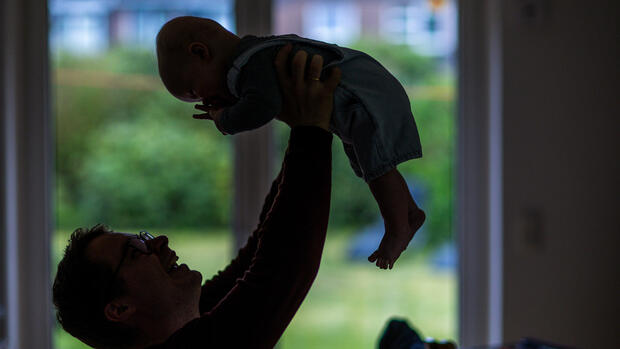The software company SAP has announced that from next year in Germany fathers and all other partners will be given six weeks of paid leave from the birth of their child.
(Photo: dpa)
Walldorf The software company SAP has gone on the offensive when it comes to balancing family and work. The DAX company from Walldorf informed its workforce in Germany on Thursday that, starting next year, fathers and other partners will be given six weeks of paid leave after the birth of their child.
“We want to show that family compatibility and career advancement are not contradictions,” said SAP’s human resources manager in Germany, Cawa Younosi. He expects 700 to 800 fathers per year if more than 90 percent of those eligible accept the offer. This is expected to result in costs amounting to several million euros annually.
In the coalition agreement, the governing parties SPD, Greens and FDP announced that they would introduce two weeks of paid leave for partners after the birth of a child. Different terms are used for the project, sometimes it is called paternity leave, sometimes it is called father’s leave – since it would mostly benefit fathers. SAP calls its program “Partner Time”.
The timing of implementation remains unclear
Federal Family Minister Lisa Paus (Greens) spoke about the project on Tuesday and called it “family start time”. This is intended to give the partner or – in the case of lesbian couples – the female partner time to look after the mother and support her in regeneration. The draft law is currently being discussed within the federal government.
In November of last year, Paus announced implementation for 2024. When asked, the ministry did not want to officially comment on a specific date.
Inquiries to several DAX companies show that SAP appears to be a pioneer with the program. Most people highlight existing offers in their answers and emphasize that they want to comply with new laws. However, none of the companies in question went as far as SAP did. There was also occasional criticism of the coalition’s plan.
>> Read also: Economists say what the four-day week would really mean
Siemens welcomed the approach of fathers’ leave with regard to an equal distribution of family care work between the genders. “From Siemens’ perspective, however – as with parental allowance – the exemption should be financed from tax revenues and not be burdened on the employers,” said the Munich-based company.
“We do not consider additional father’s leave to be necessary given our existing offers and the flexibility this allows,” said the automotive supplier and tire manufacturer Continental.
“The existing parental leave model is a success,” said Thomas Ogilvie, Chief Human Resources Officer at the DHL Group. The options available so far are well established and both fathers and mothers are happy to take advantage of them. From the company’s perspective, these do not need to be changed. There is currently one day of special leave for childbirth and parental leave, but no other time off
44% have no special leave for fathers
The sports car manufacturer Porsche welcomed the federal government’s plans. “Paid time off at the beginning of fatherhood contributes to a better balance between family and work,” said a spokeswoman. At the same time, Porsche regrets that the Federal Cabinet has halved the income limit per family for entitlement to parental allowance.
The consumer goods group Beiersdorf thinks the project is good. Deutsche Telekom also supports measures that support a good balance between job and family, a spokesman said. The pharmaceutical and technology group Merck is open to the issue. Since the company is already very well positioned with its offering, it is not currently planning any expansions.
>> Read also: Merck wants to support employees in Germany with fertility treatments
According to a recent survey, many companies in Germany do not offer special leave for fathers after the birth of a child. This is the case in 44 percent of the companies surveyed, according to a survey by the Allensbach Institute for Demoscopy on behalf of the Ministry of Family Affairs, which was available to the German Press Agency. According to this, 26 percent of the companies surveyed grant one day, and a further 26 percent grant two days. For only four percent it is more than two days.
The fact that almost half of the companies do not value their employees’ offspring even a single day of special leave speaks volumes about their perception of the work-life balance, said Elke Hannack, deputy chairwoman of the German Federation of Trade Unions.
It is good and right that the family start time should finally come now. “We are counting on the coalition to get it into the law quickly.” That would be an important signal to strengthen the partnership between family and work right from the start.
The Confederation of German Employers’ Associations (BDA) said it welcomed the fact that many partners wanted to take on more responsibility with the birth of their children.
However, you don’t need any new legal requirements for this. Parental leave and parental allowance have long given families the opportunity to take a break from work after birth. “Politicians must decide whether they want to implement new exemption claims – or whether they want to alleviate the labor shortage,” said the BDA. Both together don’t work. A one-sided financial burden on companies would also be unacceptable.
More: “Lack of courage” prevents men from taking care of children
